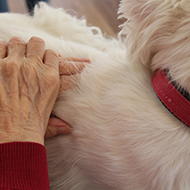Research published on robotic pets as dementia therapy

The robotic pets, with synthetic fur and programme movements and sounds, can be a useful tool in therapy.
Researchers from the University of Utah have developed guidance for using robotic pets during therapy for older adults with dementia, recording participants reactions to the pets.
Published in the Canadian Journal of Recreation Therapy (CJRT), the paper outlines the benefits of robotic pet therapy sets out the ideal session lengths, and outlines typical responses from participants in the study to assist in future research on the topic.
The concept of robotic pet therapy in dementia care has already been established, with benefits including more predictability, less potential for bites and scratches, less allergies and customisable options, including the option to remove sound for noise-sensitive participants.
Despite the potential positive impact of robotic pets on people with dementia, no unified guidance has been developed to best support people with dementia in this type of therapy.
Co-author of the study, along with Rebecca Westenskow, Rhonda Nelson, said: "There was very little information on what people were doing with the pets.
“So without that guidance, it's just a toy. And what do you do with it?"
Meeting with participants who experience severe cognitive impairment, the researchers recorded their reactions.
Nelson said: “Many participants leaned toward the [robotic pet] as it was taken out of the pet carrier, then instinctively reached for it and began petting, rubbing or scratching the pet when first introduced.”
As the robotic pets moved and made sounds, the researchers asked questions about the participants' past pets, and what they thought of the robotic pet.
“When the dog would bark they would say things like, 'Oh, are you trying to tell me something?” said Nelson.
“Or they would comment on the cat purring and would say things like, 'Wow, you must really be happy! I feel you purring.”
One such participant was a retired veterinary surgeon, and researchers were curious as to how he would respond to and interact with the robotic pets. He chose to have both the robotic dog and cat on his lap at the same time.
In the paper, researchers wrote: “Several participants used comments, sounds, specific inflections and facial expressions spontaneously with the pets.
“Some participants imitated the animal sounds made by the [pet] and repositioned the pet to look at its face or make eye contact.”
Ultimately, all participants reported enjoying the activity, with the questions relating to personal reminiscences of pets and directions for interacting with the pet gaining the most response.



 The latest
The latest